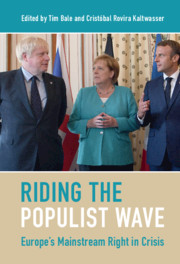Book contents
- Riding the Populist Wave
- Riding the Populist Wave
- Copyright page
- Contents
- Contributors
- Figures and Tables
- Preface
- 1 The Mainstream Right in Western Europe: Caught between the Silent Revolution and Silent Counter-Revolution
- 2 The Demand Side: Profiling the Electorate of the Mainstream Right in Western Europe since the 2000s
- 3 The Supply Side: Mainstream Right Party Policy Positions in a Changing Political Space in Western Europe
- 4 Austria: Tracing the Christian Democrats’ Adaptation to the Silent Counter-Revolution
- 5 France: Party System Change and the Demise of the Post-Gaullist Right
- 6 Germany: How the Christian Democrats Manage to Adapt to the Silent Counter-Revolution
- 7 Italy: The Mainstream Right and its Allies, 1994–2018
- 8 The Netherlands: How the Mainstream Right Normalized the Silent Counter-Revolution
- 9 Spain: The Development and Decline of the Popular Party
- 10 Sweden: The Difficult Adaptation of the Moderates to the Silent Counter-Revolution
- 11 The United Kingdom: The Conservatives and their Competitors in the post-Thatcher Era
- 12 The Mainstream Right in Western Europe in the Twenty-First Century
- References
- Index
6 - Germany: How the Christian Democrats Manage to Adapt to the Silent Counter-Revolution
Published online by Cambridge University Press: 13 August 2021
- Riding the Populist Wave
- Riding the Populist Wave
- Copyright page
- Contents
- Contributors
- Figures and Tables
- Preface
- 1 The Mainstream Right in Western Europe: Caught between the Silent Revolution and Silent Counter-Revolution
- 2 The Demand Side: Profiling the Electorate of the Mainstream Right in Western Europe since the 2000s
- 3 The Supply Side: Mainstream Right Party Policy Positions in a Changing Political Space in Western Europe
- 4 Austria: Tracing the Christian Democrats’ Adaptation to the Silent Counter-Revolution
- 5 France: Party System Change and the Demise of the Post-Gaullist Right
- 6 Germany: How the Christian Democrats Manage to Adapt to the Silent Counter-Revolution
- 7 Italy: The Mainstream Right and its Allies, 1994–2018
- 8 The Netherlands: How the Mainstream Right Normalized the Silent Counter-Revolution
- 9 Spain: The Development and Decline of the Popular Party
- 10 Sweden: The Difficult Adaptation of the Moderates to the Silent Counter-Revolution
- 11 The United Kingdom: The Conservatives and their Competitors in the post-Thatcher Era
- 12 The Mainstream Right in Western Europe in the Twenty-First Century
- References
- Index
Summary
The German Christian Democrats are one of the most successful parties of the mainstream right in post-war Europe. They have held the Chancellor’s office for approximately forty-nine years, compared with just short of twenty years for the Social Democrats (SPD), their primary opponents on the mainstream left. Although the silent revolution eventually pulled the Christian Democrats to the left as the party followed public opinion, its primary contribution has been to cause fragmentation on the left. This fragmentation has meant that the left side of the political spectrum has been weaker overall. German unification also contributed to left-party fragmentation, helping the Christian Democrats to dominate politics. The silent counter-revolution, on the other hand, has been unusually weak in Germany. This weakness meant that the Christian Democrats did not face much of a threat from the right side of the political spectrum. The combination of a strong silent revolution fragmenting the political left and a weak counter silent-revolution minimizing a threat from the right has contributed to the long-term success of the German Christian Democrats.
Keywords
- Type
- Chapter
- Information
- Riding the Populist WaveEurope's Mainstream Right in Crisis, pp. 141 - 169Publisher: Cambridge University PressPrint publication year: 2021
- 3
- Cited by

